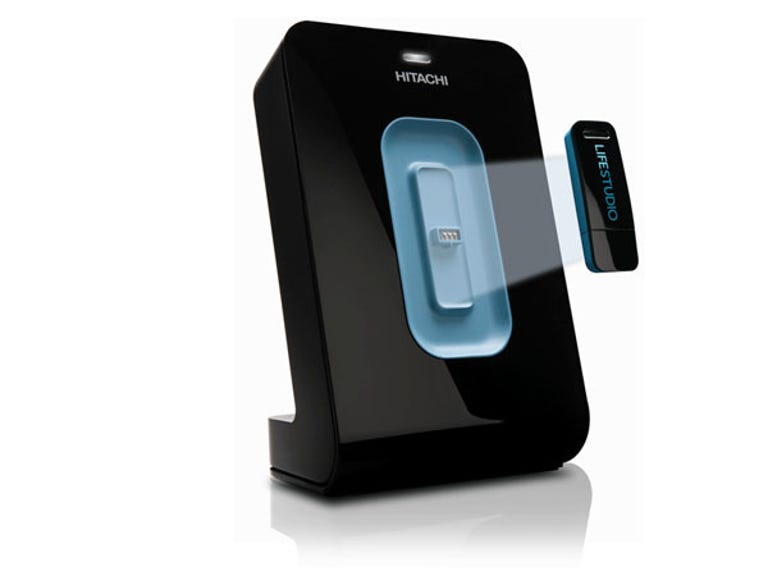 Why You Can Trust CNET
Why You Can Trust CNET Hitachi LifeStudio Desk Plus 2TB review: Hitachi LifeStudio Desk Plus 2TB
Slick included software and an expensive novelty USB flash drive aren't enough to make the DeskLife Studio plus a must-buy storage option.
Design
The DeskLife Studio Plus certainly stands out amongst external USB hard drives, for two primary reasons. We've seen external hard drives with inbuilt docks before, but the DeskLife Studio Plus takes this to an extreme, building the dock base right into the drive itself. This makes it very easy to stand up on a desk, but tougher to accommodate for moving about. With that in mind, the combined dock and 2TB drive we tested comes with an embedded magnetic dock for a 4GB USB Flash drive that clips on the front of the drive itself. The idea's pretty simple. Your most-used files go onto the flash drive, while your larger backups sit on the main drive itself. The drive comes with an AC power adaptor, further tethering it to a desk, although the upside of this is that it requires only one USB 2.0 port to operate.
The Good
The Bad
The Bottom Line
Features
A front-mounted USB Flash drive is what makes this the DeskLife Studio "Plus" model. You can purchase just a DeskLife model sans the Flash drive for AU$249 compared to the $279.99 price of the USB equipped model.
The other facet of the DeskLife's offering is Hitachi's LifeStudio software. This offers a sorting and viewing mechanism for common file types, as well as limited live streaming. In the US, this includes Hulu, but locally that's not an option. What we do get online is cloud storage for backup. The first 3GB is free, with an option to purchase 250GB online for US$49 per year.
The LifeStudio connects up and will take up to three drive letters. One for the installation partition, one for the main 2TB partition and one for the flash drive if it's connected. The Flash drive does use a standard USB interface beneath a cap, but when magnetically connected it's also read/write capable.
Performance
The LifeStudio software is quite slick and fun to use, even if the locally available version isn't quite as feature-rich as overseas offerings. The use of a scrolling wall motif makes it easy to flick through your own photos or those shared by other users. It's a step above the software offered on most drives, which usually just thinks in backup-centric terms, but it's not a mandatory installation.
As for the drive itself, in pure performance terms, the bottleneck with USB 2.0 connected hard drives is rarely in the drives, and the fact that the DeskLife ships with a Deskstar 7K2000, 7200RPM drive doesn't make a huge difference to overall read/write speed scores. We managed an average read score, testing with HDTach of 35.7MB/s, and an average write score copying the installation folder for Photoshop CS5 to the drive of 16.93MB/s.
Conclusion
The DeskLife Plus is a neat-looking drive, and the inclusion of a USB flash drive that easily hooks onto the front does give it some utility for those who need only a small quantity of portability. At the same time, the AU$30 asking premium for the 4GB Flash drive is quite high and indeed the drive itself isn't exactly leading the market in terms of price per GB.


